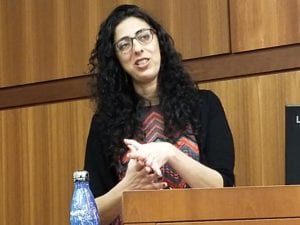
Israeli writer Ayelet Tsabari recounts the challenges of being a Mizrahi Jew, and the racism brown people endure, during her lecture at the University of Louisville. (Community photo by Lisa Hornung)
Growing up in Israel, Ayelet Tsabari spoke Hebrew and went to school like every other Jewish child. But she was different.
Her brown skin gave her away.
Her grandparents were Yemeni Jews, who had immigrated to Israel in the 1930s and had lived there ever since, in a village just east of Petah Tikva inhabited by Yemenis, Ethiopians and other Mizrahi (Middle Eastern) Jews.
In her 20s, she moved to Canada, lived there for 20 years and has since returned to Israel.
She has written about her life in her latest book, The Art of Leaving: A Memoir, a collection of essays about her life, travel and her Yemeni-Mizrahi culture. She has also published a novel, The Best Place on Earth. Both books have won and were shortlisted for several prestigious awards.
Tsabari gave the Annual Naamani Lecture at the University of Louisville on Sunday, Feb. 16, where she read from The Art of Leaving and discussed her life as a Yemeni Jew, an Israeli and a writer.
The Naamani Memorial Lecture Series honors the memory of UofL Professor Israel T. Naamani, and is supported by the Naamani Memorial Lecture Fund.
As a child, Tsabari became frustrated by the lack of stories about people who looked like her.
“I was an avid reader growing up, but in all the books that I loved, I never saw a character like me, or like my grandmother, or like my father,” she said. “The books that I cherished as a kid were all written by Ashkenazi authors and told Ashkenazi stories. Even in school, the books they assigned to us all told Ashkenazi narratives. By the time I graduated from high school, I could cite the dates of European immigration to Israel in great detail, but I knew next to nothing about my own heritage.”
While living in Canada, Tsabari has found that even fewer people understood her as a Mizrahi Jew.
“There, I learned that for Canadians, Jewish meant delis and matzah ball soups. Most people I met in Vancouver had never encountered the Yemeni Jews and knew nothing really about Mizrahi traditions.”
She recalled seeing a story in a Vancouver newspaper about Passover. “I was thrilled that there was a mention of Passover and I opened it, and the entire piece was talking about different preparation methods of matzah ball soups. At that point in my life, I never even had matzah ball soup: We eat spicy fish for Passover, or Yemeni soup with turmeric.”
She is often told she looks like an Arab, which is not incorrect. Sometimes, though, she is mistaken for an Indian, finding herself on the receiving end of racial slurs.
“People sometimes ask me if I’ve ever experienced racism as a Jew in Canada, in the world, and I always say, I’ve experienced racism, but it was never about me being Jewish; it’s always about me being brown.”
After several years in Canada, Tsabari began writing in English, which was not easy at first. She struggled with her voice. Her peers criticized her for overly sentimental images; they also said her dialogue was too direct.
“Many of the rules I was actually trying to implement in my writing, in my fiction, made no sense when you situated them against an Israeli context,” she said. “For example, I remember in my fiction class I was told that dialogue must always have subtext, that people always say one thing and mean another. Those of you who know Israelis may find that a bit odd.”
Though she took her peers’ advice, she grew unhappy with her literary voice, thinking it was no longer authentic. An instructor told her to stop reading Canadian writers and focus on immigrant and trans-national ones instead.
It worked. Tsabari found her voice.
“I do think Israeli writing tends to be more sentimental,” she said. “It can verge sometimes on melodrama, and we are passionate people, we’re dramatic people.”
She credits her family and traditions for her writing success.
“I think my love of narrative, my story, my love of writing exposition of telling, rather than just showing may come from a history of oral storytelling, which is my literary tradition that I come from,” Tsabari said. “I think that transience and belonging are very Jewish themes, because our collective history, the succession of wars and migration, haunts our present.”


